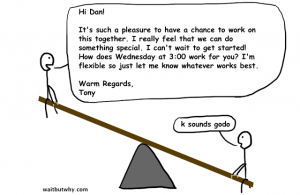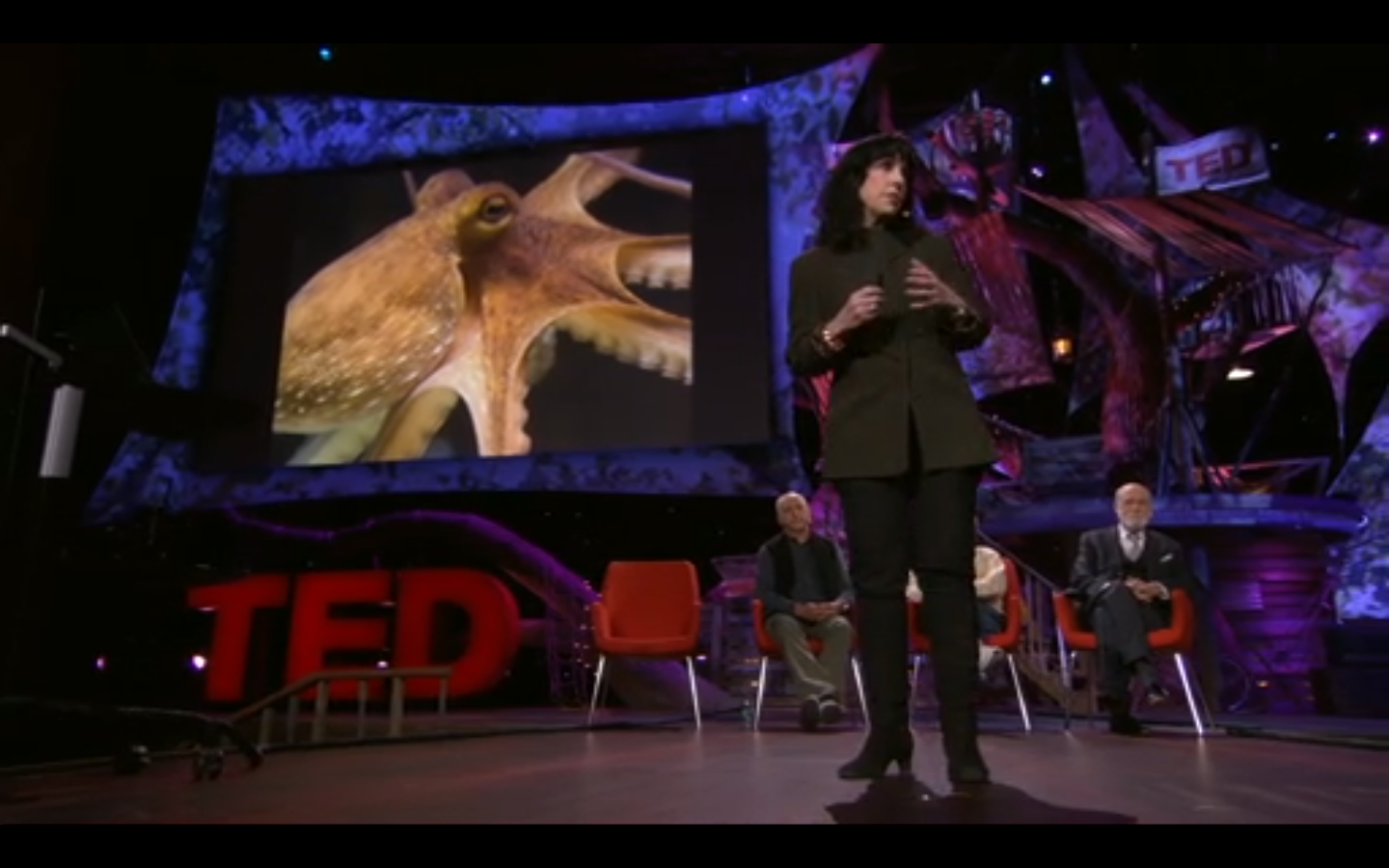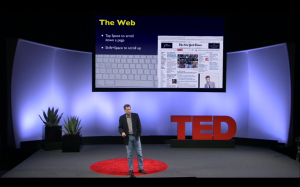Facebook made lots of headlines a few months ago when people discovered that their news feeds had been manipulated for research purposes. Many people were shocked that they’d been unwitting participants in massive social science studies. But similar research at Facebook has also been used to help the company to determine how to best help customers deal with unwanted posts. This Radiolab program explores the light and dark sides of Facebook’s gigantic social engineering projects.
www.radiolab.org/story/trust-engineers/
Category: Chapter 8 Networking and Digital Communication
 Email is a necessary part of everyday life today. This cartoon-illustrated article outlines many of the most uncomfortable aspects of email, and provides suggestions for minimizing discomfort.
Email is a necessary part of everyday life today. This cartoon-illustrated article outlines many of the most uncomfortable aspects of email, and provides suggestions for minimizing discomfort.
waitbutwhy.com/2013/12/11-awkward-things-about-email.html
When you get past all of the emotional trappings, your money is nothing more than a symbol of value, and it’s only as good as the trust we place in it. This TED talk suggests that we may be headed into an era of multiple monies.
T he Internet was conceived as a way of connecting computers, but its inventors quickly realized that the Internet was a way of connecting people. Now one of those founders, Vint Cerf, is working with Peter Gabriel, Diana Reiss, Neil Gershendfeild, and others to bring dolphins, bonobos, elephants, and other species into the Internet community. This TED talk gives us a peek at the early stages of a research project that could profoundly change our relationship with non-human inhabitants of our planet—and possibly other planets.
he Internet was conceived as a way of connecting computers, but its inventors quickly realized that the Internet was a way of connecting people. Now one of those founders, Vint Cerf, is working with Peter Gabriel, Diana Reiss, Neil Gershendfeild, and others to bring dolphins, bonobos, elephants, and other species into the Internet community. This TED talk gives us a peek at the early stages of a research project that could profoundly change our relationship with non-human inhabitants of our planet—and possibly other planets.
ted.com/talks/the_interspecies_internet_an_idea_in_progress.html
 The Internet makes it possible for people to collaborate on a massive scale, working together to accomplish tasks that might otherwise be impossible. The world of online collaboration is changing rapidly—and changing our lives in the process. Many TED talks and NPR podcasts have helped us to understand the applications and implications of collaborative technology. In this fascinating radio program, TED and NPR collaborate to explore collaboration by combining excerpts from several TED talks with interviews and commentary.
The Internet makes it possible for people to collaborate on a massive scale, working together to accomplish tasks that might otherwise be impossible. The world of online collaboration is changing rapidly—and changing our lives in the process. Many TED talks and NPR podcasts have helped us to understand the applications and implications of collaborative technology. In this fascinating radio program, TED and NPR collaborate to explore collaboration by combining excerpts from several TED talks with interviews and commentary.
www.npr.org/2013/07/13/197986218/why-we-collaborate
 David Pogue is one of the most prolific–and entertaining–tech writers we know. In this short TED talk, he runs through a list of tips that can save you time every day. Don’t miss it.
David Pogue is one of the most prolific–and entertaining–tech writers we know. In this short TED talk, he runs through a list of tips that can save you time every day. Don’t miss it.
Rumors of a Facebook phone have rattled around the tech world for quite a while. Today Facebook announced not a a phone, but software that can convert many Android phones into Facebook machines. Facebook is available in app form on most smart phones. But the new Facebook Home software will replace the Android home screen with a Facebook-centered home, making it possible for social networkers to keep Facebook at the center of their phone experiences. Will Android phone users click Like?
http://www.wired.com/gadgetlab/2013/04/facebook-android-home-phone/?cid=6882274
Crowdfunding—funding a project by asking many people for small contributions—has exploded in popularity because of Internet tools and social networks. Crowdfunding is being used to fund high-tech ventures, microbusinesses, charities, and artistic expressions. In this entertaining, moving TED talk, musician Amanda Palmer of the Dresden Dolls talks about a dimension of crowdfunding that’s rarely discussed: the emotional connections that happen when we ask friends, fans, or strangers for what we need. She argues that Internet tools aren’t as important as our attitude about asking.
ted.com/talks/amanda_palmer_the_art_of_asking.html
When you post something on Facebook, stream a movie from Netflix, or share data with Dropbox, you’re using “the cloud.” Apple’s iCloud makes it possible for 250 million people to store their music, appointments, and documents “out there” and effortlessly access them via iPhones, iPads, Macs, and other digital devices. But what, and where, is the cloud, and how does it work? This slightly technical Wired article examines the futuristic technology inside the cloud—technology that’s likely to find its way into future PCs, tablets, and phones.
wired.com/wiredenterprise/2013/03/flash-fusion-io-apple-facebook/all
NPR’s Radiolab is radio at its best—entertaining, informative, provocative. This episode will change the way you think about time and speed. One segment reveals the surprising truth about the relative speeds of the human nervous system and the Internet, and the a critical role of speed in today’s computer-controlled financial marketplace.
radiolab.org/2013/feb/05
If you don’t understand how the stock market works, you’re not alone. The market has developed a digital mind of its own, and in many ways it’s beyond human comprehension. The blog that accompanies that story includes some dazzling animated visualizations.